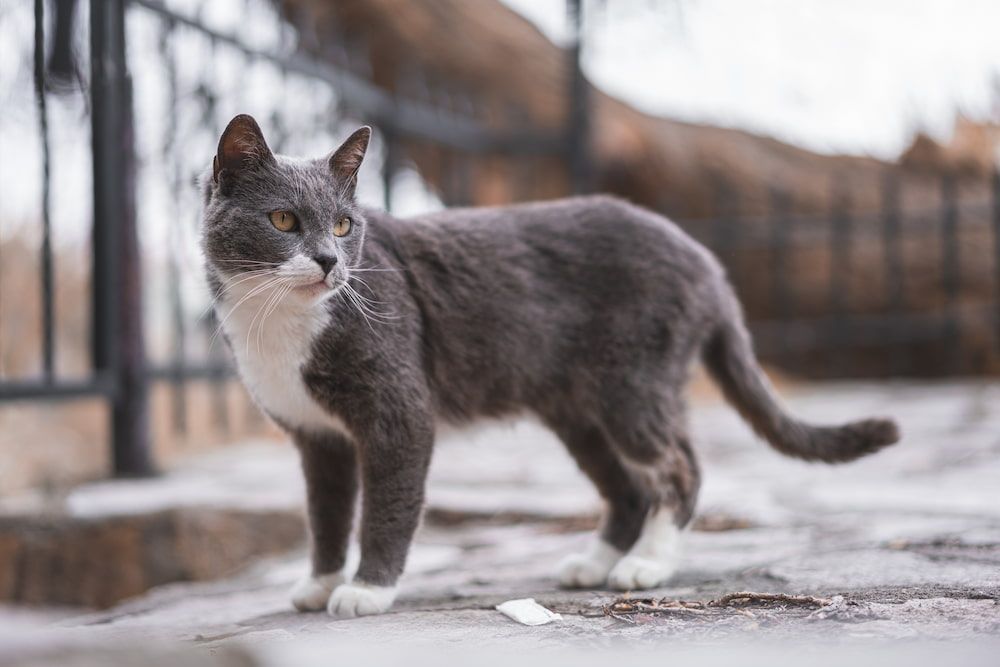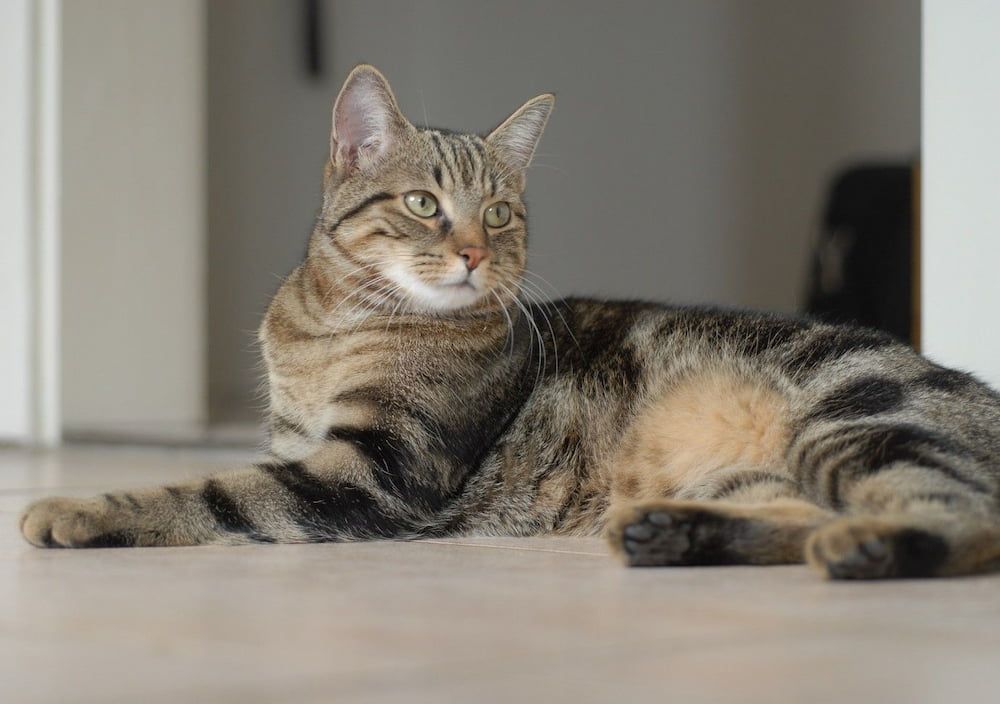Brazilian Shorthair: Breed History, Personality, Adoption and Cost
Written by:
Author: Vicki Smirnova
Vicki Smirnova is a professional writer and editor who adores animals and helps readers get along well with their pets. She has been working in digital media for more than 5 years and has great experience writing content about lifestyle, including pets. Vicki specializes in dog health and nutrition, cat feeding, dog training. She is an aquarium lover and is passionate to write about fish care at home. Also, Vicki headed several websites and worked as a news editor.
View all 244 articlesLearn about our editorial process and veterinary review board.
Viewed: 426
Updated on: 02/17/2022
Brazilian Shorthair cats are popular for their colorful coats and playfulness. They make great family companions and get along handsomely with other pets. Above all, they are intelligent, friendly, and love cuddles.
Characteristics
The Brazilian Shorthair differs from the more popular American and British Shorthair cats. They are slightly bigger and more muscular. For instance, an adult male can weigh up to 20 pounds. Nevertheless, they are muscular and energetic, making them the ideal play buddies for children. Lastly, their vibrant eyes and multicolored coats recommend them for dazzling house pets and photo shoots.
| Weight | 10-20 pounds |
| Height | 12-14 inches |
| Colors and Patterns | Various types include white, tan, brown, black, gray, and orange. |
| Lifespan | 14 to 20 years |
READ MORE: European Shorthair
Breed History
The Brazilian Shorthair evolved from stray cats roaming the picturesque streets of Brazilian cities. Its social personality convinced many to adopt and care for them as family pets. In time, they adapted to living indoors and acted as snuggle buddies for their human owners and friends.
Modern cat breeds reached the New World on colonial ships in the 16th century. An ancestor of the Brazilian Shorthair must have come to present-day Brazil and turned into feral cats. In the late 20th century, this cat developed into a purebred feline. Consequently, the World Cat Federation officially recognized the breeding standards confirming its uniqueness. However, TICA or CFA have yet to bestow the same blessing on the Brazilian Shorthair.
READ MORE: 15 Rarest Cat Breeds
Interesting Facts
- Some believe that the Brazilian Shorthair cat might have reached Brazil on Portuguese ships as the European sailors’ pets in the 1500s.
- Brazilian Shorthair can live on average more than most breeds. Some owners claim that their felines lived more than 21 years.
- The Brazilian Shorthair breed has a naturally short coat. This means that it rarely sheds or dander, leaving very few hair traces in the house. As a result, the Brazilian
- This cat breed is hypoallergenic and suitable for people with allergies.
- Brazilian Shorthair cats adapt quickly to almost any type of weather. Again, their street cats heritage makes them flexible to different temperatures and climates.
- The Brazilian Shorthair prefers a diet rich in protein. Some of your kitten’s ancestors could have been vicious hunters and eaten rodents and birds every day. Fortunately, you can provide your Shorthair with the same nutritional meals without her hunting around your home. Use the best cat food you can find to help her remain energetic, playful, and with a clean, shiny coat.
Temperament and Personality
The Brazilian Shorthair is a social cat that doesn’t shy away from interactions. Generally, it is friendly with adults, children, and other pets. They have a curious and outgoing personality. This helps it be carefree and extroverted even around strangers.
Brazilian Shorthair loves to play and snuggle. And they stop from these two favorite activities only when eating or sleeping. So, make sure that you have the time to play with them and keep them entertained.
The Brazilian Shorthair is the ideal feline companion for children. They enjoy horsing around and do not get bored as quickly as other breeds. Furthermore, their inquisitive minds make them perfect for learning tricks. Some pet parents even claim to teach their Brazilian Shorthairs how to play fetch.
While they are playful and curious, Brazilian Shorthairs are also intelligent and sharp. You cannot fool them forever with the same toy. Instead, test their agility by introducing new cat toys all the time.
After a tiring day of playing and learning tricks, a Brazilian Shorthair will become the perfect snuggles buddy. This breed loves sleeping with its pet parents and rarely leaves their bedside at night.
The Brazilian Shorthair cat breed is more curious than the average feline breed. Usually, this personality trait gets it into many shenanigans. Some of them are funny. However, others may end up rather awfully.
Generally, the Brazilian Shorthair gets along with all household pets, including dogs, rabbits, birds, fish, and other cat breeds. Nevertheless, you should keep it safe from large, aggressive dogs that are not used to feline company.
Lastly, socialization is essential in the healthy upbringing of any cat. Make sure that your Brazilian Shorthair gets along with every member of your household. And, if you live alone, invite your cat-loving friends over more often. This will help your cat develop special social skills and not be overly dependent on you.
| Potential for playfulness | 5 out 5 |
| Activity level | 5 out 5 |
| Friendliness to other pets | 4 out 5 |
| Friendliness to children | 5 out 5 |
| Grooming requirements and Shedding | 2 out 5 (do not shed much) |
| Need for attention | 3 out 5 |
| Affection toward its owners | 5 out 5 |
| Intelligence | 5 out 5 |
| Independence | 3 out 5 |
READ MORE: Fresh Pet Food Delivery Service Review (Vet Approved)
Activity
When you welcome a Brazilian Shorthair into your home, you get more than just a cat. You accept that your new housemate will be a highly energetic, playful fuzzy ball. This breed loves playing games for as long as it is awake. So, you have to ensure it gets enough exercise and playtime throughout the day. This will spend her energy and help everyone in your home sleep more peacefully at night, including your Shorthair.
Brazilian Shorthair require plenty of mental and physical stimulation. So, you may want to leave some of the cat toys lying around the room. This will give your cat something to do when you’re not around.
Give your Brazilian Shorthair cat plenty of scratching surfaces, such as a scratching post or a cat tree. This will keep it healthy, entertained, and busy. Above all, it will prevent it from scratching your furniture and couch.
Lastly, you shouldn’t force a Brazilian Shorthair to live in a small, confined apartment. This breed needs plenty of space to run around and explore. After all, its ancestors were free as birds roaming in the great outdoors.
Care
Thanks to its short coat, this cat is relatively easy to groom and care for. These kittens do not shed much even when they reach their golden years. Generally, brushing them once a week should help keep your cat’s coat neat and clean.
Many people prefer adopting Brazilian Shorthair cats because they come from a healthy breed. In fact, these cats have very few health problems. Nevertheless, you should protect them from feline-specific conditions, such as ear and eye infections as well as obesity.
Like other cats, the Brazilian Shorthair requires frequent teeth brushing. Otherwise, it risks developing cavities due to food build-up between its fangs. Make sure that you brush your kitten’s teeth regularly and take her to her periodic vet checkups with a qualified veterinarian.
Most Brazilian Shorthairs prefer cuddling with their pet parents whenever they have to sleep. You should consider this personality trait before investing in an expensive cat bed. In the end, your Shorthair may ignore the fluffy pillows you bought and prefer to sleep at the other end of your bed.
The Brazilian Shorthair cat is not picky, nor does it have specific dietary needs. Remember that this feline comes from a long line of Brazilian street cats that grew accustomed to eating anything they could find. That being said, you should feed your kitten only high-quality food to ensure it maintains its optimal health.
READ MORE: Most Affectionate Cat Breeds
Adoption
The best way to get a Brazilian Shorthair cat is adoption. Of course, plenty of cat breeders worldwide have them on sale. However, many more Shorthairs live in shelters, pet shops, and other facilities, and they need a home more than anything.
If you want to adopt a Brazilian Shorthair, talk to your local pet shelter. Additionally, you can join social media groups where other pet parents discuss adoption alternatives. You may find that one of them has a fresh litter of kittens. This is an excellent way of getting a Brazilian Shorthair from experienced cat owners.
Lastly, you may want to adopt Brazilian Shorthairs from rescue missions. Non-governmental rescue groups often save such cats from families that mistreat or abandon them. Remember that rescuing a forsaken cat is more than a generous gesture. It is a way of earning a loyal friend for life.
Useful sources to look up if you want to adopt Brazilian Shorthair:
Cost
If you want to buy a purebred kitty of this breed, you will have to pay a hefty sum. Generally, breeders sell them for anywhere between $1,000 and $3,000. However, some breeders may try to sell them for even higher prices.
Conclusion
The Brazilian Shorthair is one of the popular cat breeds globally. This cat breed is intelligent, outgoing, and highly energetic. It loves to play, learn tricks, and snuggle with you for hours. Above all, it is friendly and kind, making it an ideal play buddy for children of all ages.
FAQ
How much is a Brazilian Shorthair?
Brazilian Shorthairs cost between $1,000 and $3,000. Some breeders may sell them for even higher prices, depending on the quality of the litter.
Are Brazilian Shorthair cats hypoallergenic?
Yes, the Brazilian Shorthair breed is highly unlikely to cause allergies. However, people with extreme reactions to cat hair should stay safe from these felines.
Do Brazilian Shorthair cats shed?
The Brazilian Shorthair cat has a very short coat, which doesn’t shed or dander, and they require weekly brushes to remove most of the hair in one go. This way, you can keep your carpets and furniture free of cat hair almost constantly.
How long do Brazilian Shorthair cats live?
If they are healthy and happy, Brazilian Shorthair cats live for at least 14 years. Most specimens reach 20 years, and some have surpassed 21 years old.
 Cat Breeds Silver Bengal Cat: Important Things You Need to Know Before Buying Silver Bengal Cat
Cat Breeds Silver Bengal Cat: Important Things You Need to Know Before Buying Silver Bengal Cat - 247
- 0
 Cat Breeds Norwegian Forest Cat vs. Maine Coon: What are Their Similarities and Differences?
Cat Breeds Norwegian Forest Cat vs. Maine Coon: What are Their Similarities and Differences? - 162
- 0
 Cat Care Why Does My Cat Attack My Legs? 10 Reasons Why and What To Do About It (Vet-Approved Advice)
Cat Care Why Does My Cat Attack My Legs? 10 Reasons Why and What To Do About It (Vet-Approved Advice) - 46013
- 21
 Cat Veterinary Tips Cat Stomach Gurgling: Vet Advice on Why is Your Cat Stomach Gurgling?
Cat Veterinary Tips Cat Stomach Gurgling: Vet Advice on Why is Your Cat Stomach Gurgling? - 36469
- 4
 Cat Veterinary Tips My Cat Lost its Voice: Can Cats get Laryngitis? (Vet Advice)
Cat Veterinary Tips My Cat Lost its Voice: Can Cats get Laryngitis? (Vet Advice) - 23554
- 13























